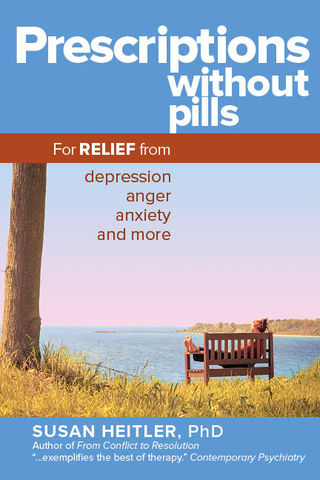Anger
Healing from a Toxic Relationship
When a friend at first sight turns out to be hurtful, here's a healing pathway.
Posted October 6, 2014

As a therapist, and especially in doing couples therapy, I often work with clients whose life includes a friend, a work associate, a sibling, a parent or a partner who hurts them. Friendship, work colleague, and love relationships are supposed to lead to life enhancement, bringing joy, emotional and physical health, blessings, fun. If instead they engender depression, frustration, disappointment and emotional distress, the relationship is toxic.
As a therapist what are my options? I listen. I observe. If I am working with the couple I aim to help stem the toxicity. Sometimes, alas, I help the two individuals both to remove themselves from the relationship to prevent further damage from the toxicity. If I am working with just the injured individual, then I guide them along the pathway of coming to grips with emotional abuse.
What is it like to live with someone who is toxic?
A therapist and also biblio-therapy (reading) can help individuals to recognize a co-worker, friend, family or loved one's counter-productive behaviors: dismissive listening and tall man syndrome; needless angers, heartless criticism, excessively controlling, mean, narcissistic, malignant narcissism and, on the receiving end, enabling, co-dependent, and stuck.
What does it take to leave this person if he or she does not show willingness or ability to change?
Ability to leave takes self-awareness. In treatment I help clients see what they themselves are doing that keeps them in a toxic relationship: wishful thinking, excessive altruism, and other so-called co-dependent and enabling behaviors. With these terms I thought I was understanding what my clients have been experiencing.
Recently, however, I read a newly-published book of poetry by Nina Palmer, a poet who describes emergence from a toxic relationship with the nuanced understanding that can be attained only by someone who herself has been there and returned.
Palmer's poems depict through natural imagery of rain, sunshine and forests what it is like to live within and then gradually to be able to leave a toxic love relationship. Palmer's poems radiate wisdom that can guide others along similar routes out of suffering.
What can you expect to find on the pathway to healing from toxic relationships, a pathway that Palmer describes so well in her poems?
The five chapters of Palmer's collected poems each focus on one phase of the journey from entrapment in a crushing relationship to emotional freedom. Following the classic stages of grief recovery, Palmer describes the subjective experience first of denial, and then of anger, depression, bargaining and, lastly, the joyful emancipation that comes with acceptance.
Clarification of these five stages in itself can be therapeutic.
Stage I: In the first stage, denial, hope springs eternal that as bad as last night may have been, tomorrow will be different.
Stage II: As awareness grows that the hurtful patterns are repetitive and unlikely to change, anger replaces eternal optimism. Excuses and minimizing for the partner's hurtful actions gives way to opposite reactions of anger and even rage.
Stage III: Depression may set in as the hopelessness of change in the current situation becomes increasingly clear. Awareness of the power in-balance between perpetrator and victim also may deepen depressive feelings.
Stage IV: Bargaining involves attempts to find some kind of workable solution.
Stage V: Differentiation, whether from emotional distancing or physical separation from the toxic partner, brings emancipation, release from the pain and freedom at last to enjoy the world's sunshine.
Here's a brief sampling of excerpts from Palmer's poems on toxic relationships, one from the first and one from the last chapters of this poetic healing journey.
From Chapter 1: Denial
Tomorrow Will Be All Right
In the depths of the night, I know the sun will rise,
It will fall upon my face and bring light to my eyes.
I will bask in the rays of golden light;
Tomorrow everything will be all right.
Another day will be better than the last.
You see, your love for me is simply masked.
If I could unearth the compassion in you,
I'll have a better day, though they are few.
...
Someday your anger will pass over.
From Chapter 5: Acceptance
The Seed
...
Slowly but surely a day at a time
My stem reaches out and I climb
I feel the earth's breath in the breeze
Winding over the hills with gentle ease.
...
And upon its light I will rise once more
On the wind my fallen petals will soar
From the blossom that waited in the night
To bloom at last in a new day's light.
----------------------------------
The poems in Palmer's Through the Trees are at once immediately accessible and at the same time deeply enlightening. If you have been or are now involved with someone who has toxic impacts on you, and whether you think of yourself as someone who reads poetry or have never read a poem before, I highly recommend this book.
Through the Trees by Nina C. Palmer can be purchased through any bookstore. It's a book to be savored and treasured, a guide through a difficult and yet doable journey to a far more joyful life path.
-----------(c) Susan Heitler, Ph.D.----------------------------------------------
Denver clinical psychologist Susan Heitler, Ph.D, a graduate of Harvard and NYU, has authored From Conflict to Resolution for therapists, plus the Power of Two book, workbook, and website that teach the couple communication skills for successful relationships.
Click here for a free Power of Two relationship quiz. Click here to learn the skills for strong and loving relationships.
Dr. Heitler's latest book, Prescriptions Without Pills: For Relief From Depression, Anger, Anxiety and More offers multiple suggestions for recovery from toxic situations. See especially Prescription # 2.9, Handle Grief and Relationship Endings Without Depression.





